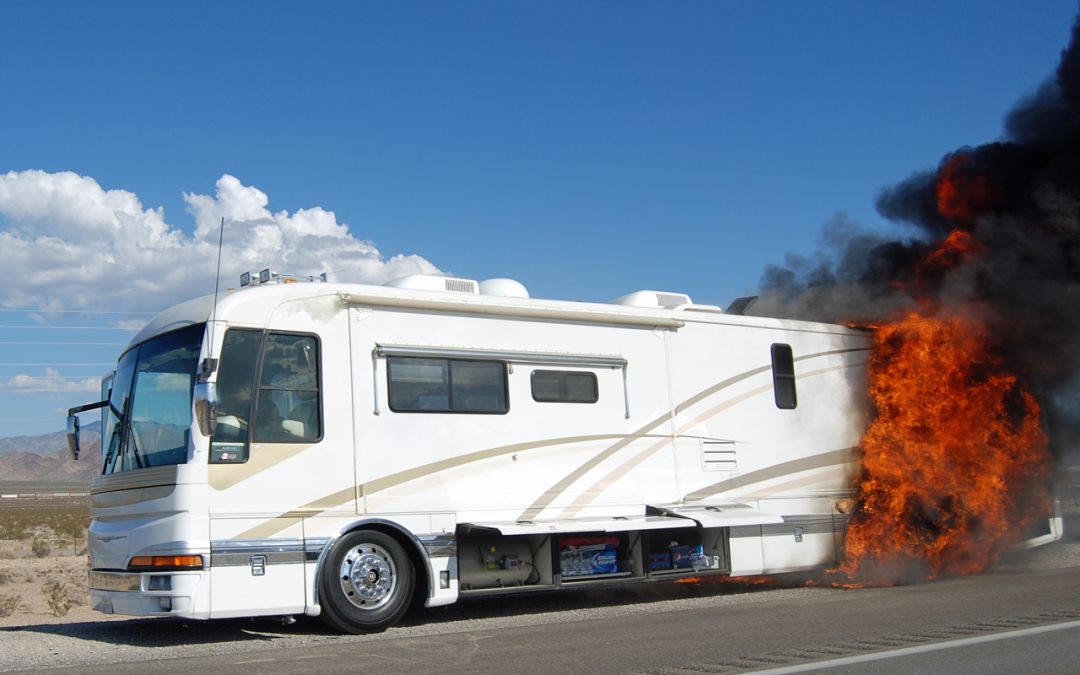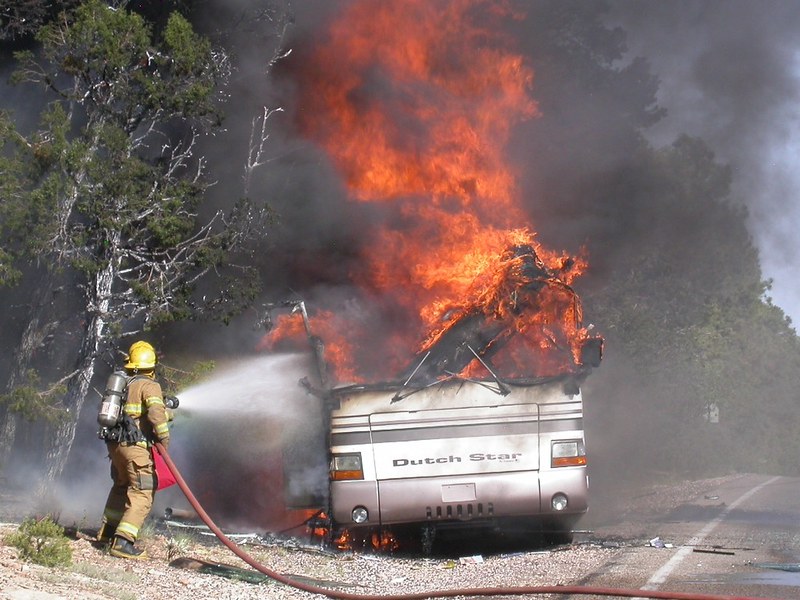Expert Tips to Keep You Safe on the Road
As an RV enthusiast, you want to explore the great outdoors and create unforgettable memories with your loved ones. However, accidents can happen, especially when it comes to fire hazards. That’s why we’ve put together this comprehensive guide on fire safety for RV enthusiasts. In this article, we’ll cover common fire hazards in RVs, expert tips to prevent fires, and what to do in case of a fire emergency.
Image by Grand Canyon National Park via flickr
Common Fire Hazards in RVs
Electrical fires are one of the most significant risks in RVs, caused by overloaded circuits, damaged wiring, or faulty appliances. Propane leaks are also a potential danger, as propane is often used for cooking, heating, and refrigeration in RVs. Cooking accidents are another fire hazard, especially if cooking appliances come into contact with flammable materials. Finally, smoking inside an RV is another significant fire hazard.
- RV Fire Safety 101
- Fire Hazards in RVs: Prevention and Response
- Leading Causes of Motorhome Fires
- RV Fire Safety Tips and Precautions
- Preventing and Responding to RV Fires
Tips to Prevent Fires in Your RV
To prevent fires from happening, follow these expert tips:
Install Smoke Alarms and Carbon Monoxide Detectors
Ensure that your RV is equipped with functioning smoke alarms and carbon monoxide detectors. Test them regularly and replace the batteries at least once a year.
Inspect Your RV’s Electrical System
Inspect your RV’s electrical system regularly, including appliances, extension cords, and surge protectors. Look for signs of damage, such as frayed wires or loose connections, and have them repaired immediately.
Keep Your RV Clean and Tidy
Clutter can be a fire hazard in RVs, so keep your RV clean and tidy. Store flammable materials in a safe and secure location.
Be Careful When Cooking
Keep flammable materials away from cooking appliances, and never leave cooking unattended. If cooking outdoors, use a fireproof grill mat and keep a fire extinguisher nearby.
Don’t Smoke Inside Your RV
Never smoke inside your RV. If you must smoke, do it outside and dispose of cigarette butts properly.
What to Do in Case of a Fire Emergency
Despite taking all necessary precautions, fires can still happen. Here’s what to do in case of a fire emergency:
- What to Do If a Fire Starts in Your RV
- Make an RV Fire Escape Plan Today
- Escaping an RV Fire
- RV Emergency Evacuation Plan with Pets
- Emergency Fire Plan for RVers
Have a Plan in Place
Create a fire emergency plan and practice it with your family or travel companions. Make sure everyone knows what to do in case of a fire, and where to meet outside.
Use Your Fire Extinguisher
If a fire breaks out, use your fire extinguisher immediately. Remember the acronym PASS: pull the pin, aim the nozzle at the base of the fire, squeeze the handle, and sweep the extinguisher from side to side, covering the base of the fire.
Evacuate Quickly and Safely
If the fire cannot be contained or is spreading rapidly, evacuate your RV immediately. Alert everyone inside and use the nearest exit. If you can’t escape through the door, use the emergency window or roof hatch. Call 911 or the emergency services as soon as possible.
Additional Fire Safety Tips
The National Park Service offers additional fire safety tips that RV enthusiasts should be aware of:
- RV Fire Safety Tips from USFA FEMA
- 8 Must-Know RV Fire Safety Tips
- RV Safety Tips from NFPA
- RV Fire Safety: We Set an RV on Fire to Learn More
- RV Fire Safety Tips from Texas Department of Insurance
Store Flammable Liquids Outside
Store flammable liquids such as gasoline, propane, and oil outside your RV in a well-ventilated area.
Check Your Tires
Ensure that your RV’s tires are in good condition and properly inflated. Tire blowouts can cause sparks and potentially start a fire.
Keep a Safe Distance
When parking your RV, make sure to keep a safe distance from other RVs and flammable materials. Give yourself enough room to maneuver in case of an emergency.
Use Campfire Rings and Fire Pits
If you plan on using a grill or campfire, make sure to follow all fire safety guidelines and regulations in the area you are visiting. Additionally, always have a bucket of water or a fire extinguisher nearby in case of an accidental fire.
Regularly Inspect Your RV’s Propane System
Propane is a commonly used fuel source in RVs for cooking, heating, and refrigeration. However, propane leaks can be a significant fire hazard. It’s essential to inspect your RV’s propane system regularly to ensure that there are no leaks. Signs of a propane leak include a strong odor like rotten eggs, hissing sounds, or the presence of frost on the propane line. If you suspect a propane leak, turn off the propane supply immediately and have a professional inspect and repair the system.
Store Flammable Materials Safely
Many RV enthusiasts carry flammable materials like gasoline, oil, and propane in their RVs. These materials can be hazardous if not stored correctly. Store these materials outside your RV in a well-ventilated area away from heat sources and sparks. Make sure they are in approved containers and are properly labeled.
Use the Right Fire Extinguisher
Having a fire extinguisher on board your RV is essential for fire safety. However, it’s crucial to have the right type of fire extinguisher. RVs require a fire extinguisher that is rated for Class A, B, and C fires, as these are the most common types of fires in RVs. Look for an extinguisher with a minimum rating of 2A:10B:C, and make sure it’s easily accessible.
Keep Emergency Exits Clear
In case of a fire emergency, it’s essential to have a clear path to the nearest emergency exit. Make sure that your emergency exits are not blocked by clutter, furniture, or other items. Keep the areas around your emergency exits clear to ensure a quick and safe evacuation in case of a fire emergency.
FAQs
Q1. What are the common fire hazards in RVs?
A1. Electrical fires caused by overloaded circuits, damaged wiring, or faulty appliances, propane leaks, cooking accidents, and smoking inside the RV are the most common fire hazards in RVs.
Q2. What are the expert tips to prevent fires in RVs?
A2. To prevent fires in RVs, it is recommended to install smoke alarms and carbon monoxide detectors, inspect the RV’s electrical system regularly, keep the RV clean and tidy, be careful when cooking, and never smoke inside the RV.
Q3. What should I do in case of a fire emergency in my RV?
A3. In case of a fire emergency in an RV, it is crucial to have a plan in place, use the fire extinguisher immediately, evacuate quickly and safely, and call 911 or emergency services as soon as possible.
Q4. What are some additional fire safety tips for RV enthusiasts?
A4. Additional fire safety tips for RV enthusiasts include storing flammable liquids outside, regularly inspecting the RV’s propane system, using the right fire extinguisher, keeping emergency exits clear, checking the RV’s tires, keeping a safe distance from other RVs and flammable materials, and using campfire rings and fire pits.
Q5. What type of fire extinguisher should I have on board my RV?
A5. RVs require a fire extinguisher that is rated for Class A, B, and C fires, as these are the most common types of fires in RVs. Look for an extinguisher with a minimum rating of 2A:10B:C, and make sure it’s easily accessible.
Conclusion
RVing is a fantastic way to explore the great outdoors and create unforgettable memories with your loved ones. However, it’s essential to prioritize fire safety when on the road. By following these expert tips, you can help prevent fires in your RV and be prepared in case of a fire emergency. Remember to inspect your RV’s electrical and propane systems regularly, store flammable materials safely, use the right fire extinguisher, and keep emergency exits clear. With these precautions in place, you can enjoy your RV adventures while keeping you and your loved ones safe.
Additional Sources:
- Always On Liberty. “RV Fire Safety and Lifesaving Fire Prevention Tips.” Always On Liberty, 2021, https://alwaysonliberty.com/2021/10/rv-fire-safety-and-fire-prevention-tips.html/. Accessed 14 Mar. 2023.
- Campanda Magazine. “RV Fire Safety: What You Need To Know.” Campanda Magazine, https://magazine.campanda.com/rv-fire-safety/. Accessed 14 Mar. 2023.
- Foremost Insurance Group. “Fire Safety for Your RV.” Foremost Insurance Group, https://www.foremost.com/learning-center/fire-safety-for-your-rv.asp. Accessed 14 Mar. 2023.
- Good Sam Blog. “How to Prevent an RV Fire.” Good Sam Blog, https://blog.goodsam.com/how-to-prevent-an-rv-fire/. Accessed 14 Mar. 2023.
- Kampgrounds of America (KOA). “10 Tips for RV Fire Safety.” KOA Camping Blog, https://koa.com/blog/tips-for-rv-fire-safety/. Accessed 14 Mar. 2023.
- Outdoorsy. “RV Fire Safety Tips: How to Prevent a Fire in Your RV.” Outdoorsy, https://www.outdoorsy.com/blog/rv-fire-safety-tips-prevent-fire-rv. Accessed 14 Mar. 2023.
- Thor Industries. “Fire Safety: Inside and Outside Your RV.” Thor Industries, https://www.thorindustries.com/stories/rv-fire-safety. Accessed 14 Mar. 2023.
- U.S. Fire Administration. “Recreational Vehicle (RV) Fire Safety.” U.S. Fire Administration, https://www.usfa.fema.gov/prevention/outreach/rv-fire-safety.html. Accessed 14 Mar. 2023.
Featured Image by Eddie Maloney from North Las Vegas, USA, CC BY-SA 2.0, via Wikimedia Commons


